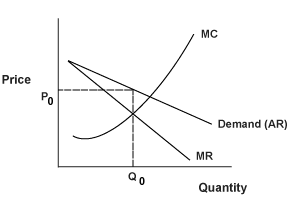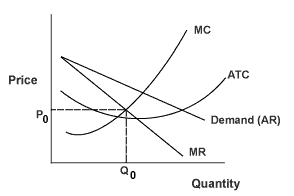Published On:Thursday, 29 December 2011
Posted by Muhammad Atif Saeed
Monopolistic Competition
A firm engaged in monopolistic competition which is considering reducing prices in order to increase total revenue has two conflicting factors to consider. Reducing prices will increase the quantity of a good sold, but the reduction in price will also apply to quantities of the good that would have been sold at a higher price.
The price searcher can maximize profit by adjusting output and the price until marginal revenue is equal to marginal cost. Notice that the marginal revenue curve lies below the firm's demand curve.
Figure 3.15: Marginal Revenue Curve In Monopolistic Competition
 |
Government regulation is often used to keep new firms out of markets. Economists generally favor deregulation as this helps to keep prices low.
Prices over the long run in a competitive market will move to the lowest point of the firm's average total cost curve. We then have allocative efficiency because desired goods are produced at the lowest possible cost.
Because price searchers face downward-sloping demand curves, the price they charge will exceed the firm's marginal cost. The price charged and the quantity produced will not be where the firm minimizes average total costs. Figure 3.16 illustrates these points.
Figure 3.16: Monopolistic Competition: Low Barriers to Entry
 |
Product Development and Marketing in Monopolistic CompetitionFirms engaged in monopolistic competition invest in product development and marketing so as to differentiate themselves from other firms in the industry. By doing so, they hope to gain more monopolistic pricing power. Since advertising increases costs, it will shift supply curves up and to the right. Ultimately, over the long run, consumers pay for the advertising in the form of higher prices.
In comparison to the pure competitive market, prices will be higher and quantities produced will be lower when there is monopolistic competition. However, there will be a greater variety of goods. This may be a worthwhile tradeoff.









